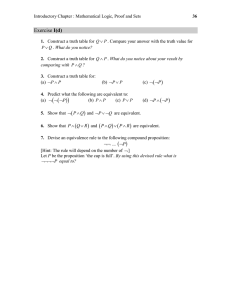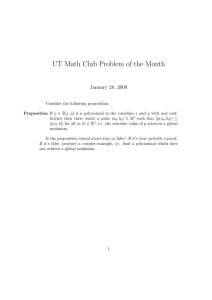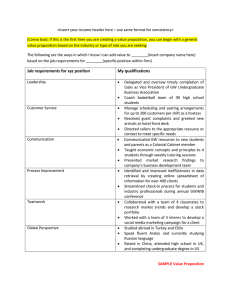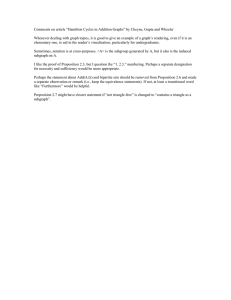Property Tax Exemption. Disabled Persons` Access.
advertisement
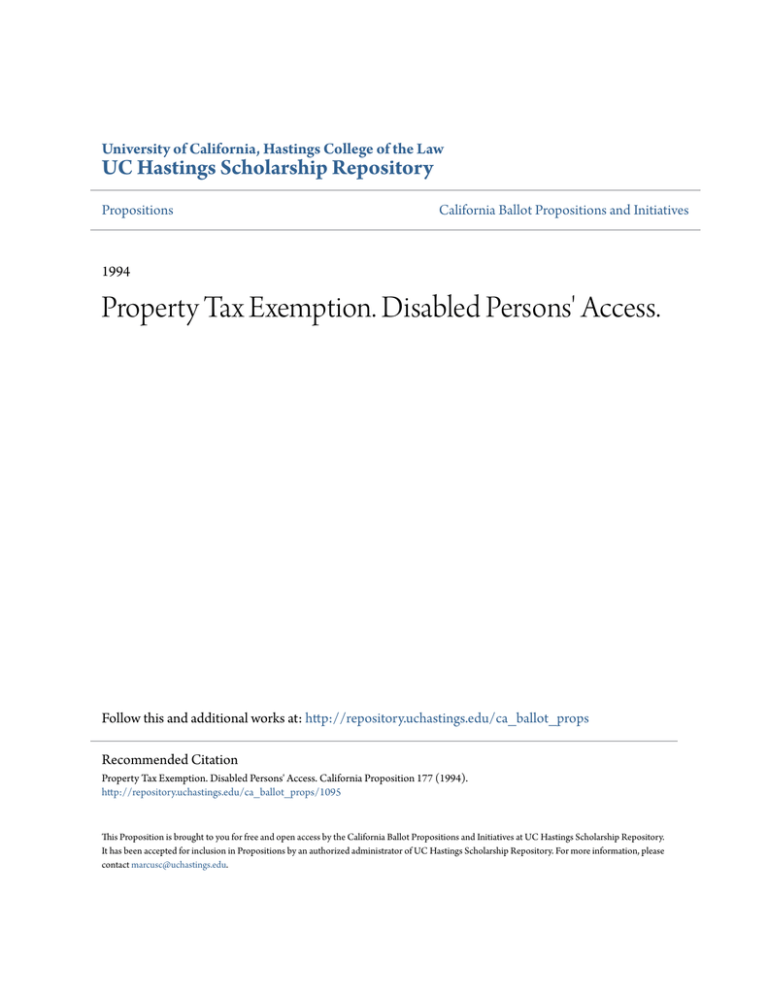
University of California, Hastings College of the Law UC Hastings Scholarship Repository Propositions California Ballot Propositions and Initiatives 1994 Property Tax Exemption. Disabled Persons' Access. Follow this and additional works at: http://repository.uchastings.edu/ca_ballot_props Recommended Citation Property Tax Exemption. Disabled Persons' Access. California Proposition 177 (1994). http://repository.uchastings.edu/ca_ballot_props/1095 This Proposition is brought to you for free and open access by the California Ballot Propositions and Initiatives at UC Hastings Scholarship Repository. It has been accepted for inclusion in Propositions by an authorized administrator of UC Hastings Scholarship Repository. For more information, please contact marcusc@uchastings.edu. , ... III rfi7 2 .. 111111 - .....- Property Tax Exemption. Disabled Persons' Access. Legislative Constitutional Amendment. Official Title and Summary Prepared by the Attorney General PROPERTY TAX EXEMPTION. DISABLED PERSONS' ACCESS. LEGISLATIVE CONSTITUTIONAL AMENDMENT. • Amends state constitution to permit Legislature to exempt from property taxation the construction, installation, removal, or modification of all or any part of an existing building or structure for the purpose of making the building or structure more accessible to, or more usable by, a disabled person. • Applicable to construction, installation, removal or modification of structures on or after effective date of measure. Summary of Legislative Analyst's Estimate of Net State and Local Government Fiscal Impact: • Property tax revenue losses to local governments would be minor in 1994-95, increasing annually for several years to a maximum annual amount probably in the range of $10 million. Cities, counties, and special districts would bear about half the loss; school and community college districts would bear the other -half. • Allor nearly all of the property tax revenue losses experienced by school and community college districts would be required to be replaced by the state's General Fund. Final Votes Cast by the Legislature on ACA 8 (Proposition 177) Assembly: Ayes 77 Noes 0 14 Senate: Ayes 37 Noes 0 P94 Analysis by the Legislative Analyst Background Local property taxes are based on each property's assessed value. As long as a property has the same owner, its assessed value generally remains the same each year, except for a small increase for inflation. Whenever property is improved (for example, the addition of a room onto a house), however, the property is reappraised and its assessed value usually increases by the value of the improvement. Current law allows some exceptions to this general rule. For example, current law exempts property owners from paying higher taxes when they make certain types of improvements to their property, such as adding fire detectors and sprinklers. In addition, current law excludes from reappraisal any building improvements that make a house more accessible to a homeowner if he or she is disabled. As a result of recent federal law, the 1990 Americans with Disabilities Act (ADA), certain property owners are now required to make changes to properties in order to improve access to and use of their properties by the disabled. Specifically, the act requires owners of "public accommodations" (that is, commercial properties that are open to the public) to (1) list structural barriers (such as stairs or narrow doors) which decrease access to and use by the disabled and (2) make improvements that are "readily achievable," (that is, can be done without much difficulty or expense relative to the resources that the owner has available). Under the federal law, "public accommodations" covers a broad range of structures, including: hotels and motels; restaurants and bars; theaters, stadiums and other entertainment facilities; retail and service establishments; and other facilities serving the public. Proposal This constitutional amendment adds another exception to the general rule on reappraising property. Specifically, property owners would not have to pay higher property taxes when they make building modifications to improve accessibility and use by disabled persons, such as those modifications required under the federal ADA. As with the current exemption for homeowners, this exemption ends when the property is sold and reappraised at its full market value. The exemption provided for in this measure applies only to building improvements made on or after June 7, 1994. Fiscal Effect By excluding the value of these building modifications, this measure would reduce property tax revenues to local governments. We estimate that the statewide property tax revenue loss probably would be minor in 1994-95, but then increase each year for several years as more structural changes are made to properties to improve disabled access and use. In the future, we estimate that property tax losses would reach a maximum annual amount probably in the range of $10 million. Cities, counties, and special districts would bear nearly one-half of the annual property tax revenue loss. The remainder of the loss would affect school and community college districts, which also receive local property tax revenue. Under existing law, the state would replace all, or nearly all, of these school district losses with increased General Fund expenditures. For the text of Proposition 177 see page 28 P94 15 177 Property Tax Exemption. Disabled Persons' Access. Legislative Constitutional Amendment. Argument in Favor of Proposition 177 Proposition 177 is a common sense measure. It opens doors for disabled individuals, creates jobs and restores fairness to the tax code. Proposition 177 should already be law. However, because of legal technicalities, Proposition 177 must be approved by voters before its many benefits are felt by Californians. Proposition 177 will allow commercial and residential property owners to make improvements that increase access for individuals with disabilities, such as installing ramps and lifts and widening doorways and halls-without penalizing owners for doing so. Businesses from your neighborhood grocery store to your favorite restaurant are being asked by the federal government to improve access for disabled individuals. The intent of the federal law is a good one. But, after completing the worthwhile construction, businesses face the· prospect of higher property taxes for making what is called "added-value" improvements.Proposition 177 corrects this obvious flaw in the system, and it parallels a similar exemption for California homeowners that was approved by voters in 1990. It creates an environment that encourages construction to remove barriers for individuals with disabilities without penalizing people with new taxes for doing so. The benefits of Proposition 177 are clear: • GREATER ACCESS FOR DISABLED INDIVIDUALS-Proposition 177 will encourage greater disability access in commercial and residential properties, including apartments, restaurants, stores, theaters, offices and hotels. • JOBS WILL BE CREATED-Proposition 177 will encourage renovation and stimulate demand for employees to design and build the access improvements. • RESTORES FAIRNESS-Proposition 177 will restore fairness to the tax code, enabling businesses to do the right thing without being penalized. The value of Proposition 177 has not been lost on the state legislature. The usually fractious Assembly and Senate both placed this measure on the ballot without a dissenting vote! Among the many organizations supporting Proposition 177 are: • California Association of Persons with Handicaps • National Multiple Sclerosis Society • California State Council of Laborers • California Hotel & Motel Association • California Lodging Industry Association • California Restaurant Association These diverse groups all agree that Proposition 177 is a "win-win" for the people of California. Social goals will be met, economic benefits will result and fairness will be restored to the system. On a ballot containing tough choices, Proposition 177 allows you to make an easy "yes" vote. Join us in voting "yes" for equal opportunity. Join us in voting "yes" for jobs. Join us in voting ''YES'' on Proposition 177! LINDA WYATI' President, California Association of Persons with Handicaps ARCHIE mOMAS Officer, California State Council of Laborers DAN HAUSER Member, California State Assembly, 1st District Rebuttal to Argument in Favor of Proposition 177 We are a couple with disabilities. One of us is blind. The other developed MS (multiple sclerosis) in the last several years. If the property tax system created by Proposition 13 is standing in the way of reconstruction designed to improve access and use by persons with disabilities, we are all for a change. However, we are also homeowners. We pay more or less in property taxes than our neighbors depending largely on when the property was last purchased. If we ever want to move, we would face sky-high property taxes at the new address. If our children ever manage to buy homes, they would have to pay property taxes based on 16 current market values. That isn't fair. What should be changed is our entire property tax system. A change in ownership or new construction should never trigger reassessment. We need a comprehensive amendment to Proposition 13-not more little changes for one group or another. This year, let's insist that every candidate for the State Legislature and for Governor tell voters exactly what comprehensive amendment to Proposition 13 he or she will advocate if elected. GAYLE A ROSEMAN RICHARD E. ROSEMAN Arguments printed on this page are the opinions of the authors and have not been checked for accuracy by any official agency. P94 Property Tax Exemption. Disabled Persons' Access. Legislative Constitutional Amendment. 177 Argument Against Proposition 177 This is another proposal by the Legislature to lessen the impact on some persons of the automatic reassessment provIsIOn in Proposition 13, a constitutional limitation on property taxes approved by voters in 1978. Under Proposition 13' (now Article XIIIA of the California Constitution), assessed property values generally are frozen at their 1975 levels; however, property is reassessed and higher property taxes are imposed each time property is ''purchased, newly constructed, or a change in ownership has occurred after the 1975 assessment." Proposition 13 has had the beneficial effect of holding down property taxes-particularly for persons who have owned their property since 1975. However, the automatic reassessment provision in Proposition 13 has resulted in new homeowners paying far more in property taxes than their neighbors whose property has the same market value but was purchased earlier when property was less expensive. In addition, this automatic reassessment provision has caused a gradual but massive SHIFT of the overall property tax burden FROM owners of commercial and industrial property (which is often leased but seldom sold) TO owners (and renters) of residential property. Instead of offering voters a constitutional amendment which would correct these inequities, the Legislature proposes in this measure to retain the basic flaw but authorize itself to exempt from reassessment "(t)he construction, installation, removal, or modification on or after the effective date of this paragraph of any portion or structural component of an existing building or structure if the construction, installation, removal, or modification is for the purpose of making the building more accessible to, or more usable by, a disabled person." Presumably, in its enabling legislation, the Legislature would further define the construction work exempt from reassessment to ensure the exemption is not used as a loophole for construction projects largely unrelated to making a building more accessible or usable by a disabled person. The real problem with this measure is that it only addresses a symptom of the basic unfairness built into Proposition 13. What is unfair is that property is automatically reassessed when there is a change in ownership (or new construction) and not otherwise. The unfairness of automatically reassessing property at current market value each time it changes hands or is "newly constructed" should be eliminated for everyone. The Legislature should stop TINKERING with Proposition 13 and offer voters a comprehensive amendment that makes the system fairer for everyone. For years, some legislators have talked about taxing business property at a higher rate. Another way to address the unfair shift of the property tax burden to residential owners (and renters) would be to periodically reassess all business property-regardless of whether it changes hands or is "newly constructed." Taxing businesses differently would not remedy the unfairness of one homeowner paying 10 times as much as a neighbor. This unfairness could be eliminated by periodically reassessing all residential property while AUTOMATICALLY LOWERING THE TAX RATE so that government would not get more money just because residential property values increase. GARY B. WESLEY Attorney at Law Rebuttal to Argument Against Proposition 177 This is not a debate about Proposition 13. Proposition 177 is about improving access for individuals with disabilities to commercial and residential structures without raising property taxes on those making the improvements. It is about fairness and equity. Legislation has already been passed without a dissenting vote ensuring that if Proposition 177 becomes law, no tax loopholes will be created. Only those property owners that construct, install, remove, or modify "any portion or structural component of an existing building or structure to the extent that it is done for the purpose of making the building more accessible to, or more usable by, a disabled person" will be covered. Additionally, property owners will have to notify local property tax assessors prior to construction of their desire to improve access for individuals to avoid any "misunderstandings" over what exactly an access improvement is. P94 Proposition 177 is really as simple as it sounds. It opens doors for disabled individuals; it brings more fairness to an overly complicated tax code; and it creates an environment which will spur new construction to improve access, thus creating new jobs for Californians. Proposition 177 has brought together concerned citizens and disability, labor and business organizations (including the California Chamber of Commerce). It is endorsed by Democrats and Republicans, alike. We hope you join its many diverse supporters by voting yes on Proposition 177. LAURA REMSON MITCHELL Government Issues Caordinator, National Multiple Sclerosis Society CHUCK CENTER Director, Legislative Department California State Council of Laborers HENRY MELLO Member, California State Senate, 15th District Arguments printed on this page are the opinions of the authors and have not been checked for accuracy by any official agency. 17 Proposition 175: Text of Proposed Law This amendment proposed by Senate Constitutional Amendment 9 (Statutes of 1993, Resolution Chapter 42) expressly amends the Constitution by adding a section thereto; therefore, new provisions proposed to be added are printed in italic type to indicate that they are new. PROPOSED AMENDMENT TO ARTICLE XIII SEC. 26.5. (a) For purposes of income taxation, qualified renters shall be allowed a credit against their net tax in an amount not less than $120 for married couples filing joint returns, heads of household, and surviving spouses, and in an amount not less than $60 for other individuals. (b) The Legislature may amend those statutes that implement an income tax credit for qualified renters as of January 1, 1993, and may amend or enact other statutes, as necessary to timely or properly administer the credit established by subdivision (aJ. (c) This section applies to taxable years beginning on or after January 1, 1995. Proposition 176: Text of Proposed Law This amendment proposed by Senate Constitutional Amendment 15 (Statutes of 1993, Resolution Chapter 67) expressly amends the Constitution by amending a section thereof; therefore, existing provisions proposed to be deleted are printed in stLikeotlt t,pe and new provisions proposed to be added are printed in italic type to indicate that they are new. PROPOSED AMENDMENT TO ARTICLE XIII, SECTION 26 SEC. 26. (a) Taxes on or measured by income may be imposed on persons, corporations, or other entities as prescribed by law. (b) Interest on bonds issued by the State or a local government in the State is exempt from taxes on income. (c) Income of a nonprofit educational institution of collegiate grade within the State of California is exempt from taxes on or measured by income if both of the following conditions are met: (1) it The income is not unrelated business income as defined by the Legislature,-and . (2) it The income is used exclusively for educational purposes. (d) A nonprofit organization that is exempted from taxation by Chapter 4 (commencing with Section 23701) of Part 11 of Division 2 of the Revenue and Taxation Code or Subchapter F (commencing with Section 501) of Chapter 1 of Subtitle A of the Internal Revenue Code of 1986, or the successor of either, is exempt from any business license tax or fee measured by income or gross receipts that is levied by a county or city, whether charter or general law, a city and county, a school district, a special district, or any other local agency. Proposition 177: Text of Proposed Law This amendment proposed by Assembly Constitutional Amendment 8 (Statutes of 1993, Resolution Chapter 92) expressly amends the Constitution by amending a section thereof; therefore, new provisions proposed to be added are printed in italic type to indicate that they are new. PROPOSED AMENDMENT TO SUBDIVISION (c) OF SECTION 2 OF ARTICLE XIII A (c) For purposes of subdivision (a), the Legislature may provide that the term "newly constructed" shall not include any of the following: (1) The construction or addition of any active solar energy system. (2) The construction or installatilln of any fire sprinkler system, other fire extinguishing system, fire detection system, or fire-related egress improvement, as defined by the Legislature, which is constructed or installed after the effective date of this paragraph. (3) The construction, installation, or modification on or after the effective date of this paragraph of any portion or structural component of a single or multiple family dwelling which is eligible for the homeowner's exemption if the construction, installation, or modification is for the purpose of making the dwelling more accessible to a severely disabled person. (4) The construction or installation of seismic retrofitting improvements or improvements utilizing earthquake hazard mitigation technologies, which are constructed or installed in existing buildings after the effective date of this paragraph. The Legislature shall define eligible improvements. This exclusion does not apply to seismic safety reconstruction or improvements which qualify for exclusion pursuant to the last sentence of the first paragraph of subdivision (a). (5) The construction, installation, removal, or modification on or after the effective date of this paragraph of any portion or structural component of an existing building or structure if the construction, installation, removal, or modification is for the purpose of making the building more accessible to, or more usable by, a disabled person. Proposition 178: Text of Proposed Law Article XIII and any implementing legislation may transfer the base year value of the property entitled to exemption, with the adjustments authorized by subdivision (b), to any replacement dwelling of equal or lesser value located within the same county and purchased or newly constructed by that person as his or her principal residence within two years of the sale of the original property. For purposes of this section, "any person over the age of 55 years" includes a married PROPOSED AMENDMENT TO SUBDIVISION (a) couple one member of which is over the age of 55 years. For purposes of this OF SECTION 2 OF ARTICLE XIII A section, "replacement dwelling" means a building, structure, or other shelter constituting a place of abode, whether real property or personal property, and any (a) The full cash value means the county assessor's valuation of real property land on which it may be situated. For purposes of this section, a two-dwelling unit as shown on the 1975-76 tax bill under "full cash value" or, thereafter, the shall be considered as two separate single-family dwellings. This paragraph shall appraised value of real property when purchased, newly constructed, or a change apply to any replacement dwelling which was purchased or newly constructed on in ownership has occurred after the 1975 assessment. All real property not or after November 5, 1986. already assessed up to the 1975-76 full cash value may be reassessed to reflect In addition, the Legislature may authorize each county board of supervisors, that valuation. after consultation with the local affected agencies within the county's boundaries, For purposes ofthis section, "newly constructed" does not include real any of the to adopt an ordinance making the provisions of this subdivision relating to following: (J)Real property whieh that is reconstructed after a disaster, as declared by transfer of base year value also applicable to situations in which the replacement the Governor, where the fair market value of the real property, as reconstructed, . dwellings are located in that county and the original properties are located in another county within this State. For purposes of this paragraph, "local affected is comparable to its fair market value prior to the disaster. Also, the teIln "nenly agency" means any city, special district, school district, or community college constL tided" shill! not indtlde the (2) That portion of reconstruction or improvement to a structure, constructed district which receives an annual property tax revenue allocation. This paragraph shall apply to any replacement dwelling which was purchased or newly of unreinforced masonry bearing wall construction, necessary to comply with any constructed on or after the date the county adopted the provisions of this local ordinance relating to seismic safety during the first 15 years following that subdivision relating to transfer of base year value, but shall not apply to any reconstruction or improvement. . (3) That portion of any improvement to real property that consists of the replacement dwelling which was purchased or newly constructed before installation of water conservation equipment, as defined by the Legislature, for November 9, 1988. The Legislature may extend the provisions of this subdivision relating to the agricultural use. transfer of base year values from original properties to replacement dwellings of IIowe,et, the The Legislature may provide that under appropriate homeowners over the age of 55 years to severely disabled homeowners, but only circumstances and pursuant to definitions and procedures established by the with respect to those replacement dwellings purchased or newly constructed on or Legislature, any person over the age of 55 years who resides in property which is after the effective date of this paragraph. eligible for the homeowner's exemption under subdivision (k) of Section 3 of This amendment proposed by Senate Constitutional Amendment 4 (Statutes of 1993, Resolution Chapter 93) expressly amends the Constitution by amending a section thereof; therefore, existing provisions proposed to be deleted are printed in stlikeotlt type and new provisions proposed to be added are printed in italic type to indicate that they are new. 28 P94
